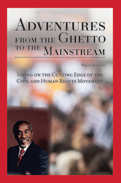
 |
Adventures from the Ghetto to the Mainstream: Living on the Cutting Edge of the Civil and Human Rights Movement
by William Lord
As a man whose young years were spent in the midst of the Great Depression and the ambience of the Harlem Renaissance, William Lord has a vivid story to tell. He was part of the gang, or “social club” scene, by his early teens and soon learned how to defend himself, developing skills that would one day transform him into a professional boxer. He was also blessed with powerful ambition. He joined the US Air Force where his pugilist abilities earned him attention. Back in Harlem, he went from fighting to running nightclubs and restaurants, contending with mobsters and the crooked New York City police who were always ready to arrest Black men on the slightest pretext. Lord also married, put himself through college and moved into the uptown profession of banking. Gradually he became conscious of racial inequality and determined to struggle against it. As a banker he worked with the NAACP and other organizations to expose racism at work; as a realtor he developed ploys to reveal the illegal racial policies of “red-lining” and “steering.” He campaigned for Jesse Jackson, Al Sharpton, and Adam Clayton Powell, and he organized the Long Island contingent to Louis Farrakhan’s Million Man March.
Lord’s vibrant, no-holds-barred writing style is appealing. Though he highlights his political and human rights activism, he has not tried to hide his troubled youth on the streets. Much of the book comprises letters of praise for his work in both private and public spheres. He notes the resurgence of police violence against young blacks in the current headlines. He holds out hope for the new generation of Blacks, including his own family, because the racial progress that he helped foster has, in some important ways, taken hold in America. In his eighties, he still has an active resumé and offered his services to get out the vote for Barack Obama’s re-election in 2008. William Lord is a street-smart fighter who turned his anger towards injustices against his people.